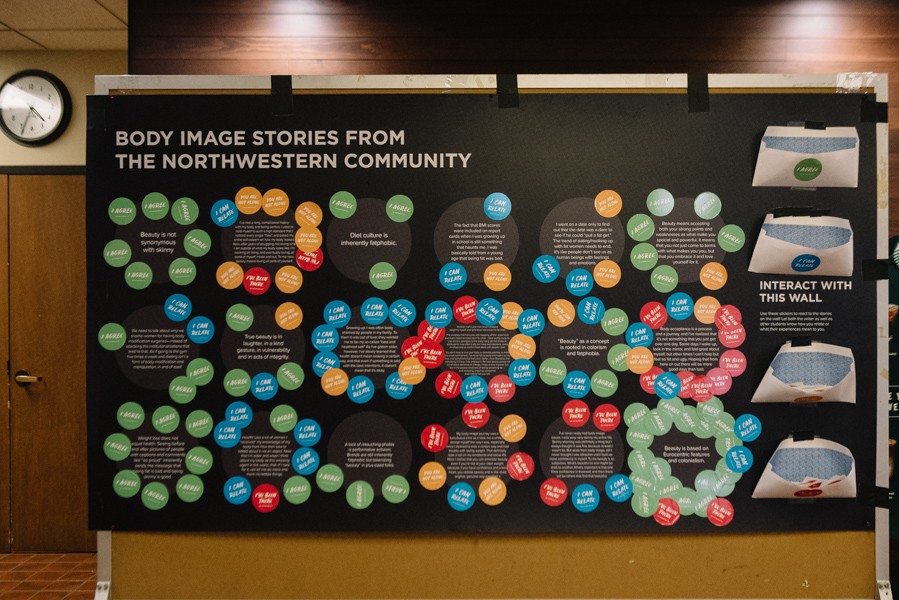For Body Acceptance Week, students demand acknowledgment of all forms of beauty
Noah Frick-Alofs/The Daily Northwestern
A board set up at Norris University Center for Body Acceptance Week, where students can share their body image stories. When talking about body images, Weinberg first-year Alicia Jones said it is also important to challenge racial ideals of beauty.
February 28, 2019
Northwestern students and staff said they appreciate the Counseling and Psychological Services-sponsored Body Acceptance Week, but challenged the movement to be more intersectional.
Body Acceptance Week is an initiative from the National Eating Disorders Association, in conjunction with Eating Disorders Awareness Week, that typically takes place during the last week of February. NU has sponsored its own Body Acceptance Week programming through CAPS for over five years. This year, the theme of Body Acceptance Week is “Every Form of Beauty.”
The goal of the week is to encourage students to see beauty in themselves and others regardless of size or body shape, Monika Gutkowska, CAPS staff psychologist and assistant director of outreach and education, said in an email.
“We want to emphasize that beauty takes many shapes, form and sizes and there is no such thing as a ‘perfect body,’” she said.
The body positivity movement, Gutkowska said, was a reaction to the highly-enhanced images that exist in advertisements and social media. While she applauds the initiative for encouraging people to accept their bodies, she also said the movement still centers around middle-class white experiences and often contains “many contradictory messages.”
Weinberg first-year Alicia Jones said the lack of diversity among those advocating for body acceptance limits their reach. She appreciated that the corkboard held at Norris University Center as part of this week’s programming challenged racial ideals of beauty as well as ones regarding size.
“It’s hard to see someone spreading ideas about body positivity when they don’t look like you,” Jones said.
Jones recognized social media as the core problem for many students struggling with body image. She said there are a lot of people who spread body positivity on social media, but “there’s also a lot of negativity.”
Although he is now confident about his body, Weinberg sophomore Aran Mehta said he, too, was once insecure about his appearance. He said the dating culture on campus pushes students to present themselves as viable, attractive partners, which makes them more self-conscious.
Mehta said unrealistic ideals are prevalent in the media, but acknowledged these images don’t affect him the same way they might affect his female peers.
“Because of how society is, these kind of toxic body norms have affected women far more than men, and I think this comes along with the hypersexualization of women in advertisement and the media,” he said. “While a narrative also exists for men, women have been hit much much harder, and it’s important to recognize that.”
Gutkowska said many of the students visiting CAPS have concerns with body image that are often fueled through media ideals, even if they do not show symptoms of disordered eating.
Gutkowska and Mehta both said that because body image issues are often so taboo, it can be hard to open up about them, which makes acknowledging and lifting up these struggles important.
“It takes a whole community to lift people, but it takes one negative comment, one statement that’s out of line to destroy someone’s self-confidence,” Mehta said.
Email: josiahbonifant2021@u.northwestern.edu
Twitter: @bonijos_iahfant
Related Stories:
— Northwestern participates in ‘You Are Beautiful’ campaign
— Body Acceptance Week speaker addresses Asian American body image


